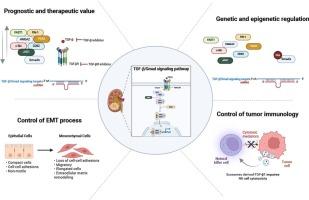揭示肾癌进展中TGF-β/Smad信号:预后和治疗见解
IF 9.7
1区 医学
Q1 BIOCHEMISTRY & MOLECULAR BIOLOGY
Biochimica et biophysica acta. Reviews on cancer
Pub Date : 2025-06-10
DOI:10.1016/j.bbcan.2025.189372
引用次数: 0
摘要
全世界所有新发癌症病例中约有2%至3%是肾癌。然而,在过去的几十年里,世界范围内这种恶性肿瘤的患病率每年增加2%。在三年内,20%到40%的早期恶性肿瘤患者可能会局部复发或转移,20%到30%的患者会被诊断为转移性疾病。对于肾癌,传统的化疗和放疗是无效的,而转移性治疗与几种副作用和迅速出现耐药性有关。作为一种沉默的疾病,没有特异性和可识别的体征和症状,并且具有侵袭性,迫切需要发现可靠的预后生物标志物以及新的治疗靶点。多项研究表明,肾癌是一种具有影响肿瘤发生和进展的复杂基因组和表观基因组背景的疾病,研究这种疾病背后的细胞通路失调是解决这一需求的必要条件。在这种情况下,典型的TGF-β信号通路可能会揭示有趣的线索。目前的研究试图概述这一信号机制在肾癌动力学中的作用,重点关注其潜在的预后、预测和治疗相关性。本文章由计算机程序翻译,如有差异,请以英文原文为准。

Unveiling the TGF-β/Smad signaling in renal carcinoma progression: Prognostic and therapeutic insights
About 2 to 3 % of all new cancer cases worldwide are renal carcinomas. Nevertheless, during the past few decades, there has been a 2 % annual increase in the prevalence of this malignancy worldwide. Within three years, 20 to 40 % of individuals with early-stage malignancies may either have a local recurrence or metastasis, and 20 to 30 % will receive a diagnosis of metastatic illness. For renal cancer, traditional chemotherapy and radiation are ineffective, while metastatic-focused treatments are linked to several side effects and the quick emergence of resistance. As a silent disease with no specific and identifiable signs and symptoms and an aggressive nature, there is an urgent need to discover trustworthy prognostic biomarkers as well as novel therapeutic targets. With multiple studies suggesting that renal carcinoma is a disease with complex genomic and epigenomic backgrounds influencing tumor development and progression, it is essential to study the dysregulated cellular pathways behind this disease to address this need. In this context, the canonical TGF-β signaling pathway could reveal interesting clues. The current study attempts to outline the role of this signaling mechanism in renal cancer dynamics, with a focus on its potential prognostic, predictive, and therapeutic relevance.
求助全文
通过发布文献求助,成功后即可免费获取论文全文。
去求助
来源期刊

Biochimica et biophysica acta. Reviews on cancer
医学-生化与分子生物学
CiteScore
17.20
自引率
0.00%
发文量
138
审稿时长
33 days
期刊介绍:
Biochimica et Biophysica Acta (BBA) - Reviews on Cancer encompasses the entirety of cancer biology and biochemistry, emphasizing oncogenes and tumor suppressor genes, growth-related cell cycle control signaling, carcinogenesis mechanisms, cell transformation, immunologic control mechanisms, genetics of human (mammalian) cancer, control of cell proliferation, genetic and molecular control of organismic development, rational anti-tumor drug design. It publishes mini-reviews and full reviews.
 求助内容:
求助内容: 应助结果提醒方式:
应助结果提醒方式:


